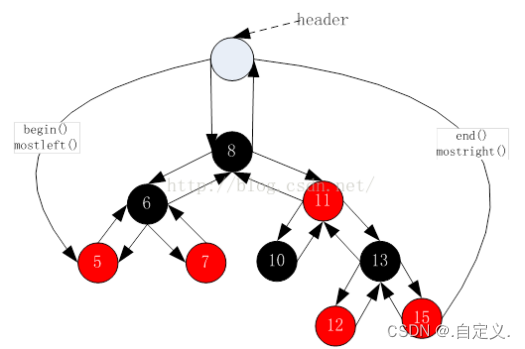目录
前言:
下面为了简单模拟实现set map所出现的代码是以C++中STL源码库中的代码逻辑基础进行的简化代码,本片博客目的是带你简单深入底层,了解set map底层的实现逻辑,对泛型编程有更加深刻的认识。
一、学前铺垫(泛型编程)
本篇博客我们通过对一个红黑树进行改造,使其可以让set和map的模拟实现都使用这一个红黑树结构,因为set map所存储的数据类型不一样,set底层存储的是pair<key,key>,map底层存储的是pair<key,value>,所以这里就一定会用上多个模板对红黑树进行改造,形成泛型编程,之后再对set map使用改造后的红黑树进行封装,达到模拟STL库中set map的效果。(有能力的可以直接去看STL中set map所实现的源码,逻辑与我所讲述的相同)
二、改造红黑树
1.红黑树节点的改造
这里节点的构造基本与二叉搜索树的节点构造相同,但是因为要同时兼顾set map两中类型,所以存储数据的类型不可以写死,要用到模板,节点代码如下:
template <class T> struct RBTreeNode { RBTreeNode<T>* _left; RBTreeNode<T>* _right; RBTreeNode<T>* _parent; Color _col; T _data; RBTreeNode(const T& data) :_left(nullptr) , _right(nullptr) , _parent(nullptr) , _data(data) , _col(RED) {} };2.insert的改造
需要改造的地方:
1) 根据STL库中的set和map的insert的功能,插入成功返回插入位置所在的迭代器以及true,插入失败说明树中已存在改值,返回该值所在的位置的迭代器以及false,所以返回类型应为pair<iterator,bool>,所以返回类型需要进行改造。
2) 在insert中大小值的比较,因为要兼容set和map,而在set中的模板类型只需要一个就可以进行初始化,因为set中底层数据类型是一样的,而map不同,map底层类型其实是pair<key,pair<key,value>>实现,因为在实现find函数时需要用到key的值并且与set保持一致,所以将value类型定义为pair<key,value>,那么在后续的比较大小中就不能那么随意了,因为set直接拿其节点指向的_data进行比较即可,而map中的_data为pair<key,pair<key,value>>,不可以直接拿来进行比较,所以我们将代码进行改造。
下面是模拟实现set,map的简单封装。SetKeyOFT,MapKeyOFT就是解决大小比较所定义的内部类。
Mymap.h:
template <class K,class V> class map { public: struct MapKeyOFT { const K& operator()(const pair<K, V>& kv) { return kv.first; } }; private: RBTree<K, pair<K,V>, MapKeyOFT> _t; };Myset.h:
template <class K> class set { public: struct SetKeyOFT { const K& operator()(const K& key) { return key; } }; private: RBTree<K,K, SetKeyOFT> _t; };insert函数改造实现:
pair<iterator,bool> Insert(const T& data) { //二叉树为空,插入第一个值 if (_root == nullptr) { _root = new Node(data); _root->_col = BLACK; return make_pair(iterator(_root),true); } KeyOfT kot; //后续插入 Node* parent = nullptr; Node* cur = _root; while (cur) { if (kot(cur->_data) > kot(data)) { parent = cur; cur = cur->_left; } else if (kot(cur->_data) < kot(data)) { parent = cur; cur = cur->_right; } else { //不允许冗余 return make_pair(iterator(cur),false); } } //找到对应位置 cur = new Node(data); cur->_parent = parent; Node* newcur = cur; if (kot(parent->_data) > kot(data)) { parent->_left = cur; } else { parent->_right = cur; } //父亲的颜色是黑色也就结束 while (parent && parent->_col == RED)//红黑树出现错误需要改正 { Node* grandfather = parent->_parent; if (grandfather->_left == parent) { //舅子树在右边 Node* uncle = grandfather->_right; if (uncle && uncle->_col == RED) { //存在且颜色为红 parent->_col = BLACK; uncle->_col = BLACK; /*if (grandfather == _root) { grandfather->_col = BLACK; } else { grandfather->_col = RED; }*/ grandfather->_col = RED; cur = grandfather; parent = grandfather->_parent; } else { //舅子树不存在或颜色为黑 if (parent->_left == cur) { //单旋 parent->_col = BLACK; grandfather->_col = RED; RNode(grandfather); } else { //双旋 先左再右 LNode(parent); cur->_col = BLACK; grandfather->_col = RED; RNode(grandfather); } break; } } else { //舅子树在左边 Node* uncle = grandfather->_left; if (uncle && uncle->_col == RED) { parent->_col = BLACK; uncle->_col = BLACK; grandfather->_col = RED; cur = grandfather; parent = grandfather->_parent; } else { if (parent->_right == cur) { //单旋 parent->_col = BLACK; grandfather->_col = RED; LNode(grandfather); } else { //双旋 RNode(parent); LNode(grandfather); grandfather->_col = RED; cur->_col = BLACK; } break; } } } _root->_col = BLACK; return make_pair(iterator(newcur),true); }因为只在红黑树insert函数里面使用的都是模板,所以是不知道所传数据的具体类型,但是在模拟实现的set,map中知道其对应的类型,所以我们可以在set,map类里面定义一个类,在这个类里面定义一个仿函数用于提取所对应比较大小的值,再将这个类用模板参数传递给红黑树中,在需要比较大小时提前用这个类定义一个变量,在通过仿函数进行大小的比较,这样就可以实现set,map的兼容。
3.迭代器的实现
迭代器的好处是可以方便遍历,是数据结构的底层实现与用户透明。如果想要给红黑树增加迭代 器,需要考虑以前问题:● begin()与end()STL明确规定,begin()与end()代表的是一段前闭后开的区间,而对红黑树进行中序遍历后, 可以得到一个有序的序列,因此:begin()可以放在红黑树中最小节点(即最左侧节点)的位 置,end()放在最大节点(最右侧节点)的下一个位置,关键是最大节点的下一个位置在哪块? 能否给成nullptr呢?答案是行不通的,因为对end()位置的迭代器进行--操作,必须要能找最 后一个元素,此处就不行,因此最好的方式是将end()放在头结点的位置:

● operator++()与operator--()
// 找迭代器的下一个节点,下一个节点肯定比其大 void Increasement() { //分两种情况讨论:_pNode的右子树存在和不存在 // 右子树存在 if (_pNode->_pRight) { // 右子树中最小的节点,即右子树中最左侧节点 _pNode = _pNode->_pRight; while (_pNode->_pLeft) _pNode = _pNode->_pLeft; } else { // 右子树不存在,向上查找,直到_pNode != pParent->right PNode pParent = _pNode->_pParent; while (pParent->_pRight == _pNode) { _pNode = pParent; pParent = _pNode->_pParent; } // 特殊情况:根节点没有右子树 if (_pNode->_pRight != pParent) _pNode = pParent; } } // 获取迭代器指向节点的前一个节点 void Decreasement() { //分三种情况讨论:_pNode 在head的位置,_pNode 左子树存在,_pNode 左子树不 存在 // 1. _pNode 在head的位置,--应该将_pNode放在红黑树中最大节点的位置 if (_pNode->_pParent->_pParent == _pNode && _pNode->_color == RED) _pNode = _pNode->_pRight; else if (_pNode->_pLeft) { // 2. _pNode的左子树存在,在左子树中找最大的节点,即左子树中最右侧节点 _pNode = _pNode->_pLeft; while (_pNode->_pRight) _pNode = _pNode->_pRight; } else { // _pNode的左子树不存在,只能向上找 PNode pParent = _pNode->_pParent; while (_pNode == pParent->_pLeft) { _pNode = pParent; pParent = _pNode->_pParent; } _pNode = pParent; } }4.完整改造代码
#pragma once #include <iostream> using namespace::std; enum Color { RED,//(0) BLACK//(1) }; template <class T> struct RBTreeNode { RBTreeNode<T>* _left; RBTreeNode<T>* _right; RBTreeNode<T>* _parent; Color _col; T _data; RBTreeNode(const T& data) :_left(nullptr) , _right(nullptr) , _parent(nullptr) , _data(data) , _col(RED) {} }; template <class T,class Ref,class Ptr> struct __RBTreeIterator { typedef RBTreeNode<T> Node; typedef __RBTreeIterator<T, Ref, Ptr> Self; Node* _node; __RBTreeIterator(Node* node) :_node(node) {} Ref operator*() { return _node->_data; } Ptr operator->() { return &_node->_data; } bool operator!=(const Self& s) { return _node != s._node; } Self& operator--() { if (_node->_left) { //存在左子树 Node* cur = _node->_left; while (cur->_right) { cur = cur->_right; } _node = cur; } else { //不存在左子树 Node* parent = _node->_parent; if (parent && parent->_left == _node) { //为父亲的左孩子 while (parent && parent->_left == _node) { _node = parent; parent = parent->_parent; } _node = parent; } else { //为父亲的右孩子 _node = parent; } } return *this; } Self& operator++() { if (_node->_right) { //存在右子树 _node = _node->_right; while (_node && _node->_left) { _node = _node->_left; } } else { //不存在右子树 Node* parent = _node->_parent; while (parent && _node == parent->_right) { _node = parent; parent = parent->_parent; } _node = parent; } return *this; } }; template <class K, class T, class KeyOfT> class RBTree { typedef RBTreeNode<T> Node; public: typedef __RBTreeIterator<T, T&, T*> iterator; typedef __RBTreeIterator<T,const T&,const T*> const_iterator; RBTree() = default;//强制编译器生成构造函数 //拷贝构造 RBTree(RBTree<K, const T, KeyOfT>& t) { _root = copy(t._root); } iterator begin() { Node* LeftMin = _root; while (LeftMin && LeftMin->_left) { LeftMin = LeftMin->_left; } return iterator(LeftMin); } iterator end() { return iterator(_root->_parent); } const_iterator begin() const { Node* LeftMin = _root; while (LeftMin && LeftMin->_left) { LeftMin = LeftMin->_left; } return const_iterator(LeftMin); } const_iterator end() const { return const_iterator(nullptr); } //右单旋,满足二叉树引发右单旋之后平衡因子一定为0 void RNode(Node* parent) { Node* pparent = parent->_parent; Node* subL = parent->_left; Node* subLR = subL->_right; parent->_left = subLR; if (subLR) subLR->_parent = parent; subL->_right = parent; parent->_parent = subL; if (pparent) { subL->_parent = pparent; if (pparent->_left == parent) { pparent->_left = subL; } else { pparent->_right = subL; } } else { _root = subL; subL->_parent = nullptr; } } //左单旋 void LNode(Node* parent) { Node* pparent = parent->_parent; Node* subR = parent->_right; Node* subRL = subR->_left; parent->_right = subRL; if (subRL) subRL->_parent = parent; subR->_left = parent; parent->_parent = subR; if (pparent) { subR->_parent = pparent; if (pparent->_left == parent) { pparent->_left = subR; } else { pparent->_right = subR; } } else { _root = subR; subR->_parent = nullptr; } } pair<iterator,bool> Insert(const T& data) { //二叉树为空,插入第一个值 if (_root == nullptr) { _root = new Node(data); _root->_col = BLACK; return make_pair(iterator(_root),true); } KeyOfT kot; //后续插入 Node* parent = nullptr; Node* cur = _root; while (cur) { if (kot(cur->_data) > kot(data)) { parent = cur; cur = cur->_left; } else if (kot(cur->_data) < kot(data)) { parent = cur; cur = cur->_right; } else { //不允许冗余 return make_pair(iterator(cur),false); } } //找到对应位置 cur = new Node(data); cur->_parent = parent; Node* newcur = cur; if (kot(parent->_data) > kot(data)) { parent->_left = cur; } else { parent->_right = cur; } //父亲的颜色是黑色也就结束 while (parent && parent->_col == RED)//红黑树出现错误需要改正 { Node* grandfather = parent->_parent; if (grandfather->_left == parent) { //舅子树在右边 Node* uncle = grandfather->_right; if (uncle && uncle->_col == RED) { //存在且颜色为红 parent->_col = BLACK; uncle->_col = BLACK; grandfather->_col = RED; cur = grandfather; parent = grandfather->_parent; } else { //舅子树不存在或颜色为黑 if (parent->_left == cur) { //单旋 parent->_col = BLACK; grandfather->_col = RED; RNode(grandfather); } else { //双旋 先左再右 LNode(parent); cur->_col = BLACK; grandfather->_col = RED; RNode(grandfather); } break; } } else { //舅子树在左边 Node* uncle = grandfather->_left; if (uncle && uncle->_col == RED) { parent->_col = BLACK; uncle->_col = BLACK; grandfather->_col = RED; cur = grandfather; parent = grandfather->_parent; } else { if (parent->_right == cur) { //单旋 parent->_col = BLACK; grandfather->_col = RED; LNode(grandfather); } else { //双旋 RNode(parent); LNode(grandfather); grandfather->_col = RED; cur->_col = BLACK; } break; } } } _root->_col = BLACK; return make_pair(iterator(newcur),true); } bool IsRBTree() { if (_root->_col == RED) { cout << "根节点为红节点" << endl; return false; } int DefNum = 0; Node* cur = _root; while (cur) { if (cur->_col == BLACK) { DefNum++; } cur = cur->_left; } return _Check(_root, 0, DefNum); } ~RBTree() { Destory(_root); _root = nullptr; } private: Node* copy(const Node* root) { if (root == nullptr) { return nullptr; } Node* newnode = new Node(root->_data); newnode->_col = root->_col; newnode->_left = copy(root->_left); if(newnode->_left) newnode->_left->_parent = newnode; newnode->_right = copy(root->_right); if (newnode->_left) newnode->_left->_parent = newnode; return newnode; } void Destory(Node* root) { if (root == nullptr) { return; } Destory(root->_left); Destory(root->_right); delete root; root = nullptr; } bool _Check(Node* root, int BlackNum, int DefNum) { if (root == nullptr) { if (BlackNum != DefNum) { cout << BlackNum << "|" << DefNum << endl; cout << "存在黑色节点数量不相等的路径" << endl; return false; } return true; } if (root->_col == RED && root->_parent->_col == RED) { cout << root->_kv.first << "->存在连续的两个红节点" << endl; return false; } if (root->_col == BLACK) { BlackNum++; } return _Check(root->_left, BlackNum, DefNum) && _Check(root->_right, BlackNum, DefNum); } Node* _root = nullptr; }; 三、set的模拟实现封装
set的底层为红黑树,因此只需在set内部封装一棵红黑树,即可将该容器实现出来(具体实现可参 考map)。template <class K> class set { public: struct SetKeyOFT { const K& operator()(const K& key) { return key; } }; typedef typename RBTree<K, K, SetKeyOFT>::iterator iterator; typedef typename RBTree<K, const K, SetKeyOFT>::iterator const_iterator; pair<iterator,bool> insert(const K& key) { return _t.Insert(key); } iterator begin() { return _t.begin(); } iterator end() { return _t.end(); } const_iterator begin() const { return _t.begin(); } const_iterator end() const { return _t.end(); } private: RBTree<K, const K, SetKeyOFT> _t; };四、map的模拟实现封装
template <class K,class V> class map { public: struct MapKeyOFT { const K& operator()(const pair<K, V>& kv) { return kv.first; } }; typedef typename RBTree<K, pair<const K, V>, MapKeyOFT>::iterator iterator; typedef typename RBTree<K, pair<const K, V>, MapKeyOFT>::iterator const_iterator; V& operator[](const K& key) { pair<iterator,bool> ret = _t.Insert(make_pair(key,V())); return ret.first->second; } pair<iterator,bool> insert(const pair<K,V>& kv) { return _t.Insert(kv); } iterator begin() { return _t.begin(); } iterator end() { return _t.end(); } const_iterator begin() const { return _t.begin(); } const_iterator end() const { return _t.end(); } private: RBTree<K, pair<const K,V>, MapKeyOFT> _t; };五、完结撒❀
如果以上内容对你有帮助不妨点赞支持一下,以后还会分享更多编程知识,我们一起进步。
最后我想讲的是,据说点赞的都能找到漂亮女朋友❤

